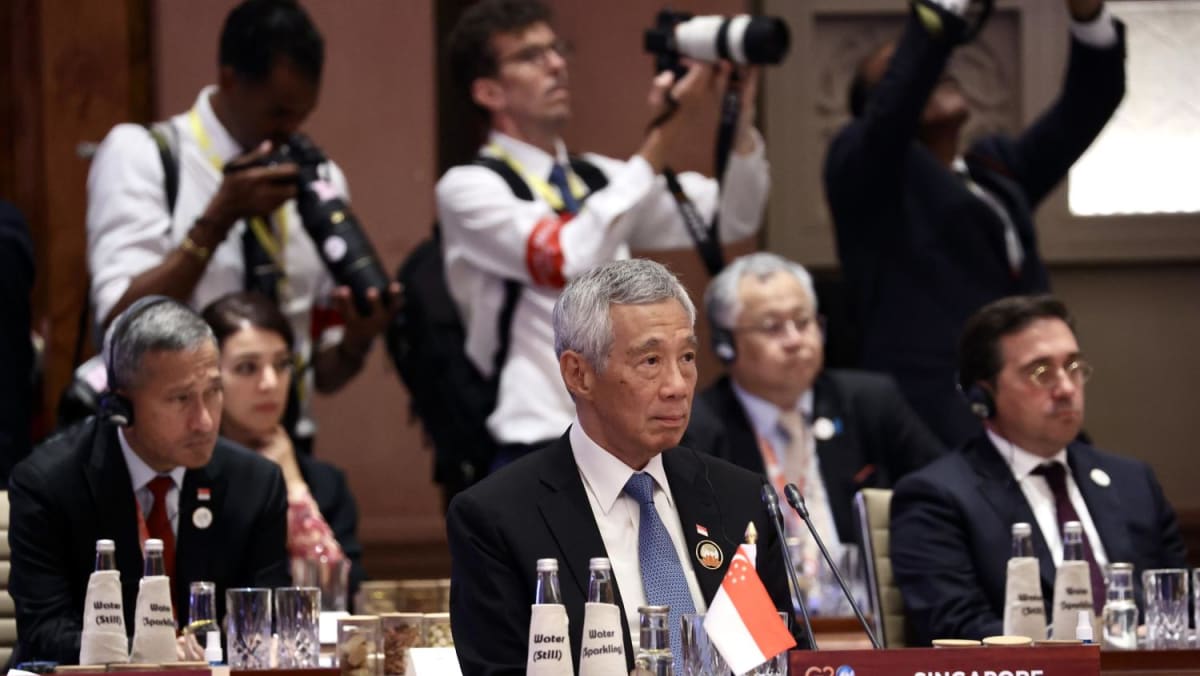
NEW DELHI — New technologies such as hydrogen fuels and carbon capture offer hope in tackling climate change, but such endeavours would require international collaborations to succeed, said Prime Minister Lee Hsien Loong on Saturday (Sept 9).
Governments cannot achieve net-zero targets on their own, said Mr Lee, urging nations to work together with private funds to “crowd-in” and complement public capital investments in net-zero initiatives.
“Countries need to deepen cooperation to advance global climate action and ambition, while smoothening our climate transitions,” said Mr Lee at the first session of the Group of 20 (G20) Leaders’ Summit in New Delhi, India.
Chaired by Indian Prime Minister Narendra Modi, the theme for the two-day summit is One Earth, One Family, One Future, with sustainable development and efforts to tackle climate change on the agenda.
Singapore is not a G20 member, but Mr Lee is attending the intergovernmental forum this weekend at the invitation of Mr Modi this year, in India’s capacity as G20 president for 2023.
Speaking to an audience of G20 leaders, as well as representatives from other non-G20 countries and organisations invited to attend, Mr Lee said that as a low-lying “alternative-energy disadvantaged island-state”, Singapore appreciates the inherent challenges in climate transitions.
“However, we believe that new technologies, new financing models and new markets offer us hope,” he said.
These require international collaboration which the G20 can and should provide leadership for, he added.
Mr Lee said technologies like hydrogen and carbon capture, utilisation and storage are “critical elements” to support countries efforts to decarbonise.
Low-carbon hydrogen and hydrogen-derived fuels are potential low-emission alternatives to traditional fuels. Carbon capture, utilisation and storage refer to a process that captures carbon dioxide emissions from sources like coal-fired power plants, preventing such emissions from pollute the atmosphere.
To this end, Mr Lee said that Singapore has developed a National Hydrogen Strategy to green its power sector.
Unveiled in 2022, the strategy involves tapping hydrogen technology to complement and diversify Singapore’s power mix. Hydrogen could supply up to half of Singapore’s power needs by 2050, depending on technological developments and the development of other energy sources.
“The viability of deploying hydrogen at scale will depend on establishing reliable and resilient global supply chains with international partners. And this, no country can do alone,” said Mr Lee.
“(Singapore) looks forward to working with like-minded partners to diversify our power mix and realise the potential of low-carbon hydrogen in hard-to-abate sectors.”
Turning to financing models, Mr Lee said that trillions of dollars of investments are needed annually for the world to achieve net-zero by 2050.
This is a feat that requires governments to collaborate with each other and to work together with the private sector, he said.
A McKinsey & Co analysis in January last year estimated that the figure could reach US$9.2 trillion (S$12.6 trillion) a year annually until 2050.
“We need to catalyse more private funds at scale to crowd-in and complement public capital,” said Mr Lee on Saturday.
As for Singapore, the city-state is exploring a blended finance platform that brings together financing from the public, private and philanthropic sectors, he said, adding that the nation is keen to partner others interested in such an initiative.
BILATERAL MEETINGS
On Saturday, he met World Trade Organization Director-General Ngozi Okonjo-Iweala, where he reiterated Singapore’s support for the open and rules-based multilateral trading system as embodied by the WTO.
Mr Lee also discussed with Dr Ngozi how Singapore can further contribute to the work of the WTO, a spokesperson from Singapore’s Prime Minister’s Office said.
He also met with President of the United Arab Emirates (UAE), Sheikh Mohamed Zayed Al Nahyan. During the meeting, both countries agreed to explore greater cooperation in areas such as green energy.
Also on Saturday, Mr Lee met with his counterpart from the United Kingdom, Mr Rishi Sunak, for the first time since Mr Sunak became the Prime Minister last October.
During the meeting, the leaders issued a joint declaration upgrading the relationship between both nations to a “strategic partnership”, pledging to deepen cooperation in five key “pillars” ranging from economic to sustainability.
Following the three meetings, Mr Lee took part in the launch of the Global Biofuel Alliance, which comprised Brazil, India and the US as among its initiating members.
The alliance, of which Singapore has signed on as an observer country, brings together countries to “accelerate the development and deployment” of sustainable biofuels as it recognises the importance of the fuel in reducing greenhouse gas emissions.
Mr Lee is accompanied by Minister for Foreign Affairs Vivian Balakrishnan, Minister in the Prime Minister’s Office and Second Minister for Finance and National Development Indranee Rajah, as well as senior officials from their ministries.